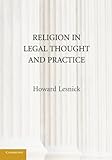Religion in legal thought and practice
Material type: TextPublication details: New York Cambridge University Press 2010Description: xx,623p. ill. ; 26 cmISBN:
TextPublication details: New York Cambridge University Press 2010Description: xx,623p. ill. ; 26 cmISBN: - 9780521134484
- 205 22 LE-R
- K3280 .L47 2010
 Print
Print
| Item type | Home library | Collection | Call number | Status | Date due | Barcode | |
|---|---|---|---|---|---|---|---|
 Print
Print
|
OPJGU Sonepat- Campus Main Library | General Books | 205 LE-R (Browse shelf(Opens below)) | Available | 112610 |
Browsing OPJGU Sonepat- Campus shelves, Collection: General Books Close shelf browser (Hides shelf browser)

|

|

|

|

|

|

|
||
| 204.410954 JA-L Love jihad and other fictions : simple facts to counter viral falsehoods / | 204.645 DA-R Ripples in tranquil waters | 205 FA-C Comparative religious ethics a narrative approach to global ethics | 205 LE-R Religion in legal thought and practice | 205.6242 WO- World religions and norms of war | 205.6242095 ET- Ethics of war in Asian civilizations a comparative perspective | 205.671 HO- Hosting the stranger between religions |
Includes bibliographical references (p. 607-613) and indexes.
[Pt.] I. Introduction -- [Pt.] II. Moral obligation and religious belief -- [Pt.] III. Religion and some contemporary moral controversies -- [Pt. IV. The interaction between religion and the secular law -- [Pt.] V. Responding to religious diversity -- [Pt.] VI. Religiously grounded moral decision-making in professional life.
"This book examines moral issues in public and private life from a religious but not devotional perspective. Rather than seeking to prove that one belief system or moral stance is right, it undertakes to help readers more fully understand the effect of religious beliefs and practices on ways of conceiving and addressing moral questions, without having to accept or to reject any specific religious outlook. It shows how the similarities between religions and the differences within any one religion are more important than the reverse. The book asks, Where do moral imperatives come from, and how do the answers found in religion and law interact?, How does the fact that a moral norm is grounded in religion affect our thinking about it?, What is the significance of the differences (and similarities) between religious and secular sources of moral norms?"--Provided by publisher.
There are no comments on this title.

